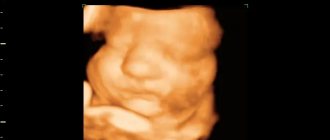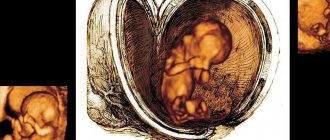Toxicosis during pregnancy - what is it?
Toxicosis is a condition of a person spoiled by some kind of toxin. Despite the fact that a pregnant woman is carrying an unborn child, which is not something toxic for her, the body treats the fertilized egg, and then the embryo, as a foreign body. In order for all body systems to be able to exist together with a new “neighbor”, the body needs to undergo many cardinal changes associated with the production of active organic substances in different quantities: some less, others more.
The female body can react to these changes in different ways. Some suffer from nausea and vomiting, while others do not notice anything special. Experienced obstetricians say that a woman’s personal attitude towards pregnancy is crucial. As a rule, desired children are born more easily than those whose mothers doubted that they were ready, that they could cope with the responsibility and the birth itself. The calmer the expectant mother psychologically tolerates her new condition, the less often toxicosis manifests itself.
In what cases during pregnancy does a gynecologist require special attention?
- Physiological pregnancy of a healthy woman
. Involves monthly consultations with the obstetrician-gynecologist leading the patient, passing mandatory tests for diseases, and preparation for childbirth. If toxicosis is present, the gynecologist will prescribe additional tests - you will need to take a biochemical blood test and a general urine test. - Pregnancy after IVF.
Requires careful screening in any case. In case of toxicosis, additional examination is necessary. In case of severe toxicosis, you will have to be treated in a hospital. - Multiple pregnancy
, due to the significant burden on the body and possible premature birth, is accompanied by enhanced obstetric control. - Pregnancy in the presence of chronic diseases
. Women with endocrine and cardiovascular diseases, disorders of the kidneys and digestive organs, and joint diseases will have to visit the gynecological clinic especially often, especially in the later stages. - Pregnancy with pathological disorders
. The presence of any pathological disorders (extragenital pathologies in a woman in labor, abnormal position of the fetus, immunological or genetic disorders identified in it) require regular monitoring and consultation with specialized specialists - an endocrinologist, geneticist, etc. In case of severe toxicosis, inpatient treatment is recommended.
How does toxicosis manifest itself?
The main signs of toxicosis are nausea and vomiting. A woman may feel sick in the morning, even before she eats breakfast or drinks a glass of water. For many, the morning begins not with the morning toilet, but with vomiting. In addition, pregnant women tend to react more strongly to certain odors that previously did not attract their attention. You can especially notice the smell from the refrigerator, which is often far-fetched.
Some women cannot stand the look and taste of meat, and some cannot stand near fish in the supermarket. Toxicosis during early pregnancy is usually limited to disturbances in the gastrointestinal tract and an exacerbation of the sense of smell. I don’t consider it dangerous, except in some cases when a pregnant woman cannot eat normally due to hypertoxicosis. This is a condition in which the expectant mother is unable to eat, and all the food she eats comes back through the esophagus. In such situations, the gynecologist decides to hospitalize the woman in order to maintain the body through IVs.
However, toxicosis is not a diagnosis, but only a description of a woman’s condition, combining nausea and vomiting in the early stages of pregnancy. Late toxicosis also occurs, and it causes more concern than that which manifests itself in the first weeks of pregnancy.
Risk factors for early toxicosis in pregnant women
Provoking factors leading to the development of early toxicosis during pregnancy include: - chronic diseases of the digestive system, kidney disease; - stress, increased nervous excitability, depression; - hereditary predisposition; - chronic intoxication (including smoking, drinking alcohol).
Symptoms of early toxicosis in pregnant women
Symptoms of early toxicosis of pregnant women often appear at 5-6 weeks of pregnancy. Moderate nausea, intermittent vomiting in the morning, changes in food habits, and odor intolerance are not a disease if they do not lead to weight loss, weakness, or decreased performance; rather, these symptoms remind a woman of pregnancy. With any degree of early toxicosis in pregnant women, a decrease in the weight of the pregnant woman is observed; with moderate and severe degrees, blood pressure decreases, the pulse increases, drowsiness, weakness, and irritability occur. Most pregnant women with toxicosis complain of decreased appetite; even the smell of food causes a gag reflex. The most common form of early toxicosis is vomiting. Depending on the severity of the vomiting symptom, there are 3 degrees of severity of toxicosis.
First degree - mild vomiting. Vomiting occurs no more than 5 times a day, more often after eating. The general condition of the pregnant woman remains normal, and weight loss is no more than 3 kg. Laboratory tests reveal no deviations from the norm.
Second degree - moderate vomiting. Vomiting occurs up to 10 times a day (on an empty stomach or after eating), and weight loss in 2 weeks can be 3 kg. The general condition of the pregnant woman is deteriorating. The pulse rate increases, and blood pressure, on the contrary, decreases. Acetone appears in the urine.
The third step is uncontrollable, excessive vomiting. Vomiting occurs up to 25 times a day. Such vomiting causes dehydration and sudden weight loss for the pregnant woman (weight loss can reach 10 kg). Her skin becomes dry and flabby, an unpleasant odor appears from her mouth, her body temperature rises, her pulse quickens, her blood pressure decreases, and general lethargy is noted. Tests show impaired renal and liver function.
How to deal with toxicosis
At the first signs of toxicosis, you should urgently contact an obstetrician-gynecologist. A severe form of toxicosis poses a threat to the life of the pregnant woman and the fetus.
For mild vomiting during pregnancy, treatment is possible in a antenatal clinic; if the condition worsens or treatment is ineffective, hospital treatment is indicated.
In the hospital, complex therapy is carried out, which includes a therapeutic and protective regime, correction of water and electrolyte balance (intravenous administration of isotonic sodium chloride solution, glucose with drugs that normalize liver function, vitamins, drugs that suppress the excitability of the vomiting center).
To normalize the function of the central nervous system, electrosleep or electroanalgesia, endonasal electrophoresis with vitamin B1 are used. Hyperbaric oxygen therapy is used.
Complex therapy is continued until vomiting ceases, general condition normalizes, body weight gradually increases, and laboratory parameters improve. The ineffectiveness of the therapy is an indication for termination of pregnancy.
Diet for toxicosis in pregnant women
To reduce the manifestations of toxicosis, pregnant women are recommended to follow a regimen: sleep at night should be at least 9-10 hours, and it is also necessary to find time to rest during the day. It is important to provide a pregnant woman with emotional peace. It is especially useful to spend 2-3 weeks in the fresh air (at the dacha, in a sanatorium); a change of environment and regular walks reduce the manifestations of toxicosis. From the first weeks of pregnancy you should stop smoking.
A pregnant woman is recommended to adhere to a diet - eat little and often, 5-6 times a day. Food should be warm, not cold and not too hot. It is recommended to temporarily exclude spicy, sour, fried foods, as well as carbonated drinks from the diet, as this can cause nausea and vomiting. This especially applies to pregnant women with chronic diseases of the digestive system.
It is recommended to separate liquid and solid foods; it is better to drink half an hour before or an hour after meals. It's important to drink plenty to avoid dehydration, but it's best to drink small amounts often. It is advisable to snack as often as possible during the day, as an empty stomach provokes nausea. If you have an aversion to food, you need to listen to your body, since even food that is not entirely healthy, but desired, will not harm you.
You can relieve nausea in the morning by sucking on a rye cracker, and only then slowly get out of bed. During the day, drink mineral water, water with lemon, and weak green tea in small sips. Herbal medicine is indicated for early toxicosis in pregnant women, especially with mild manifestations of the disease. The most effective for toxicosis are infusions of chamomile, mint and lemon balm. 2 tablespoons of pharmaceutical chamomile are poured with boiling water (about half a liter) and left overnight in a thermos. In the morning, filter and take 3 times a day 30 minutes before meals. Melissa and mint are brewed and used in the same way. You can add a spoonful of honey and lemon to the infusion. In the summer, when you have fresh mint or lemon balm, you can carry a few leaves with you and chew them to relieve nausea. It is useful to add ginger to tea. Prevention of early toxicosis in pregnant women Prevention of toxicosis should be carried out before pregnancy, it includes: - timely treatment of chronic diseases that provoke toxicosis; - healthy lifestyle; - psychophysical preparation for the upcoming pregnancy.
When does toxicosis begin?
The first signs of toxicosis may appear two weeks after conception, which coincides with the period when a pregnancy test may already respond to altered hormone levels. Interestingly, some women who did not know about pregnancy felt well, but as soon as the doctor announced a successful conception to them, they began to experience nausea. This suggests that toxicosis of pregnancy in some cases is an absolute psychosomatic reaction. Nausea and vomiting are especially severe from the second week of pregnancy in those women who cannot stand medical examinations, are afraid of blood, or are squeamish.
In addition to the first early toxicosis, late toxicosis may also appear, which is not limited to nausea. This usually includes tissue swelling and rhinitis during pregnancy. It is extremely difficult for a pregnant woman who already has a fairly large belly to experience bouts of vomiting. Spasms of the esophagus can also affect the tone of the uterus. Body tension during gagging often even causes pain.
Symptoms of toxicosis
Food preferences change sharply, there is increased sensitivity to smells, nausea, irritability, and you constantly want to sleep.
Uncontrollable salivation, low-grade fever, and vomiting occur less frequently. Usually this condition takes a woman by surprise. She needs to continue working, taking care of her family, she has a lot of things planned. With this she goes to the doctor, already pretty tired and with a sad look. And we begin to figure it out.
Firstly, toxicosis does not torment everyone. Some people simply eat everything and do not gain weight, or even lose weight, and this is where their toxicosis manifests itself. Such women are lucky. Although they also manage to worry about this, since they have heard enough “how it should be” from their friends.
Secondly, the severity of toxicosis depends on the state of the nervous system, lifestyle and the “similarity” of the baby to the mother in protein composition.
And here's more about this.
How to deal with toxicosis
Since the nature of toxicosis is unknown, there is no clear treatment regimen. Despite the many drugs and tactics used to help women, real relief does not occur for everyone or with insufficient effectiveness.
The expectant mother needs to independently analyze each of her attacks in order to try to develop behavioral tactics that alleviate the condition. For example:
- After waking up, without getting out of bed, drink half a glass of clean water at room temperature. You can leave it on the bedside table in the evening. When the water is drunk, the body will react to it with nausea. But the urge to vomit will be much easier than on an empty stomach or with solid food fragments inside.
- It is necessary to note which foods cause particular disgust and exclude them from the diet. If a woman cannot eat egg whites, it can be replaced with nuts or other protein foods.
- When a negative reaction to acid is noted, it is better to eat half a banana for breakfast instead of the often recommended apple. It is soft, does not have a pronounced taste and contains microelements that support the functioning of the cardiovascular system.
If nausea occurs in the later stages, it is important to pay attention to the amount of food eaten. To reduce the risk of nausea, as well as get rid of frequent heartburn, you need to reduce portion sizes. The stomach cannot stretch in its usual position due to the fact that as the stomach grows, the fetus supports the digestive organ from below. Excess food in the stomach provokes reflux - the release of acid and food fragments into the esophagus, which in some people turns into heartburn, and in others develops into vomiting.
How toxicosis can end
Early toxicosis is considered less dangerous than late toxicosis, since it appears and disappears unnoticed. Late gestosis is dangerous because the pregnant woman constantly vomits, her sense of smell becomes more acute, mood swings occur, and the woman becomes irritable. All this affects the child. The causes of late toxicosis are stress, poor sleep, a short interval between births, and hormonal imbalance.
An additional disadvantage is that gestosis appears in the later stages, while a woman needs to tune in to a positive wave in order for the birth to be easier, she has to cope with her own body, which rejects food. The irritability of the expectant mother can lead to tone (tension) of the uterus and early labor. In the later stages, along with gestosis, edema may appear, protein in the urine, and the woman will constantly suffer from changes in blood pressure. Treatment of gestosis should be carried out under the supervision of a gynecologist, who selects a special diet for the woman, adjusting her lifestyle.
Precautionary measures
You need to cope with toxicosis in the early stages and treat it as a temporary phenomenon that will soon end. Nausea rarely accompanies a pregnant woman throughout her entire pregnancy. It usually ends by the end of the first trimester.
It is very important not to take any medications without the recommendation of your local gynecologist. In the early stages, the fetus develops organs and forms the basis of the nervous system. Taking even one aspirin tablet can cause serious consequences, including deformities such as a cleft palate called a cleft lip. Before you buy an antiemetic, you should definitely visit your doctor.
It is important to remember that toxicosis during the first pregnancy does not mean that nausea will recur when carrying a second child. Subsequent pregnancies are usually much easier to bear.
How can a gynecologist help you at the Diana Clinic?
In our clinic, highly qualified specialists in various specialized fields are waiting for you. We have a laboratory with the ability to conduct research and tests of any complexity and an ultrasound diagnostic room, where a new 3.4 D ultrasound machine is installed.
We offer:
- Development of an individual pregnancy management program for each patient with the appointment of a personal physician.
- Trimester screening examination with various programs, depending on the condition of the fetus and the pregnant woman.
- Additional studies (genetics, ultrasound) in any trimester to assess possible disorders in the fetus.
- An individual examination program and unscheduled urgent diagnostic procedures prescribed by the gynecologist leading the patient in connection with the manifestations of negative symptoms.
- Organization of specialized consultations with expert level specialists for women with complicated pregnancies, suspected fetal pathology and exacerbations of chronic diseases.
- Selection of gentle treatment for chronic and infectious diseases with minimal impact on the fetus and creation of opportunities for postpartum rehabilitation.
- Specialized preparation of patients with pathologies for childbirth and postpartum recovery.
Or sign up by phone: 8-800-707-15-60 (toll-free)
If you find an error, please select a piece of text and press Ctrl+Enter
Ectopic pregnancy
In an ectopic pregnancy, the fetus does not develop in the uterus, but in the cervical canal, fallopian tube, abdominal and pelvic cavities.
Normally, when an egg leaves the ovary, it enters the opening of the fallopian tube. Moving with the help of special cilia that cover the fallopian tube, after a few days the egg reaches the uterus. In normal cases, the process of fertilization of the egg occurs in the tube, then the cell appears in the uterus.
In the case of infectious obstruction of the tube or other pathology, the egg freezes in place or moves very slowly, never having time to reach the uterus. This is how an ectopic pregnancy occurs.
A blood test for hCG helps in establishing the diagnosis of ectopic pregnancy.
HCG is human chorionic gonadotropin. HCG contains alpha and beta units. Using blood tests to detect an increase in hCG levels, the presence of pregnancy can be accurately determined. So, during a normal pregnancy, the hCG level increases by 65% every two days. But with an ectopic pregnancy, this dynamics is not obvious.
In a normal pregnancy, hCG rises until the 10th week, then begins to decline. Stopping the increase in hCG levels may be a consequence of a missed or undeveloped pregnancy.
Symptoms
The most characteristic symptoms of early toxicosis:
- nausea;
- vomit;
- constipation;
- loss of appetite;
- increased salivation;
- lowering blood pressure.
Frequent bouts of vomiting and drooling lead to rapid fluid loss. As a result, the water-salt balance is disrupted. Significant fluid loss can lead to dehydration. Under such conditions, nutrients and beneficial microelements are poorly absorbed, which has an extremely negative effect on the condition of the fetus.
Women who suffer from toxicosis may feel not only physical, but also psychological discomfort. Constant attacks of nausea and frequent vomiting do not allow one to lead a normal lifestyle and lead to apathy and depression.
Poor health and negative thoughts can have a detrimental effect on the course of pregnancy, so in such cases women need to work not only with an obstetrician-gynecologist, but also with a psychologist.
A woman diagnosed with toxicosis often has an increased pulse rate and, on the contrary, a decreased blood pressure. There is a loss of body weight - sometimes it can reach up to 10% of the initial weight. Due to metabolic disorders, the appearance of the skin deteriorates - it becomes dry and pale. Sometimes dermatosis may appear, which is accompanied by itching, redness and peeling of the skin.
Consider the likelihood of fertilization
When planning pregnancy, monitor the time of ovulation. The period when conception can occur lasts no more than a day. If unprotected sexual intercourse occurs at this moment (or 1-2 days earlier), the likelihood of fertilization increases several times.
Date of pregnancy:
- 4-5 days after the date of ovulation - if sex took place several days before the middle of the menstrual cycle;
- on days 7-10 - when the event happened directly on the day the egg left the corpus luteum.
With the normal functioning of the female reproductive system, the formation of a zygote occurs within 6 to 12 hours after intercourse. It gradually grows, becomes a blastocyte, and moves into the uterus. There the embryo is fixed and its further development takes place. That's when the first symptoms of pregnancy appear.









